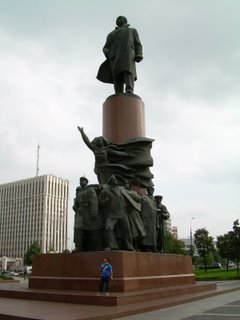
The Humanities -- 8/23/06
I have been in
I am also overwhelmed by the difficulty of immersion in a foreign language. I’m staying in a dorm with five other Community Service grantees, with whom I spend 24 hours a day, and seven English Teaching Assistants, of whom I also see plenty. All of these kids speak better Russian than I do. Almost all of them majored in Russian in college, so I am at a significant disadvantage. Fortunately, there will be no big competition to win. But, because they all speak Russian so well, the (well-meaning) ‘orientation’ coordinator decided that no translator was needed for our two site-visits to Russian NGOs yesterday. After five straight hours of being talked at by Russian professionals excited to have an audience, and having to laugh along with jokes that I alone did not understand, I felt completely drained. It occurred to me that I had failed to include in my list of fears, compiled while preparing for this trip, the fear that I might have a lot of difficulty with the language.
Today, we had an amusing lesson in ‘cross-cultural’ education. It was by a pair of professors at Moscovskiy Gumanitarniy Universitet (Moscow University of the Humanities). It was intended to be a workshop, but instead was a three-hour lecture (in English) on multiculturalism that was really appropriate for a middle school audience. It was truly absurd. Probably unlike any experience I have had before. It consisted of all varieties of cliché and irrelevant anecdote. I believe the central point was that people from different countries have different points of view and different ways of looking at things, and hence one must avoid stereotyping when one visits another country so as not to degrade into chauvinism. Basically, it was a sort of meandering ramble on the foundations of a multicultural society, obvious to anyone who grew up in one. However, the professor who kept hammering in the point about not being chauvinistic revealed his own chauvinism by continually interrupting his female co-instructor to a degree that would be humorous were it not sad and frustrating. The irony of this lecture was that it was, indeed, a lesson in cross-cultural education, in the sense that we were all clearly witnessing an educational experience from another culture. I was impressed by the ability of my cohort to play along. All giggles and looks of horrified boredom were saved for after the lecture was over.
I would ordinarily pass this off as merely a couple of bad lecturers, but this was something different. This was not a situation, it became clear, in which they had been trying to keep the material simple enough for our level but merely missed the mark. Nor was it a lack of preparation. The presentation was rife with bizarre overheads about the need for a holistic approach to global education that focused on systems instead of disconnected facts. Though they both had doctorates, the professors’ thinking was simply not well developed. As condescending as it sounds to come to such a conclusion from one encounter, this is consistent with a comment made by one of my fellow Community Service Grantees who grew up in Belarus: that while Soviet science and engineering was excellent, the Humanities and the Social Sciences had been stilted by Soviet censorship.
Furthermore, it seems to me that even in the private sector, Russian society is still in the process of developing mechanisms for incorporate feedback on the quality of work. Indeed, one of the major difficulties the Soviet Union had during its decline was the enormous cadre of Soviet managers needed to monitor quality, given the lack of price signals and the guarantee of employment. Feedback on quality is a difficult thing to build into the softer disciplines of academia even in the West, where universities benefit from low systemic corruption and, for better or worse, a highly competitive private sector surrounding it. I imagine it is even more difficult to incorporate feedback into contemporary Russian academia, still reeling from the transition.
Of course, this is a cursory observation and even more cursory of an analysis. I worry that I am being overly critical of everything I see and do, because I am in another country. I am often amazed by how dirty all the buildings are in Russia (outside the center of Moscow, of course), however, it is hard to say if they are any dirtier than the projects of Brooklyn or the south Bronx. A better comparison, perhaps, in terms of its relevance to quality of life is that of the subway system in Moscow to the subway system of any city in the U.S. I am always amazed by the Moscow Metro. The stations are clean and well lit. They often have high marble ceilings and beautifully decorated walls. The trains run every 90 seconds (and always on time!!!!) and go almost everywhere in the city. You practically never have to transfer more than once (I’ve found only one instance). I read in Lonely Planet’s once that more people use the Moscow subway every day than use the subways of New York and London combined. And I would believe it. The trains, which, as I’ve said, run every minute and a half, are always as full as any train in New York, and more full during rush hour. It is a truly humbling experience to be a part of the masses of human flesh that pour into the stations’ escalators at every moment of the day, pushing and shoving. It is like being a grain of sand in a tired, sweaty hourglass.
With regards to being overcritical, I fear I may get myself into some trouble. During our briefings at the Embassy, we were told that one grantee got into trouble last year, because people in her small town read a blog in which she made critical statements about her environs (likely no more critical than this posting). Another Fulbrighter (a scholar) was actually deported for speaking in favor of a particular ethnic autonomy movement and wearing an orange pin (playing into Putin’s paranoia that Fulbrighters are here to incite some sort of Russian version of Eukraine’s Orange Revolution). It seems reasonable to assume that this blog may one day be closely examined with oversensitive eyes. If any Russian is reading this and wondering, let me assure you that I love Russia. That is why I am here. I love Russia and want to learn about its language, culture and customs as well as the problems it faces going into the uncertain future. Just as I am critical about the way Americans face their historical legacy, I may, at times, be critical about what I see here. Do not let that fool you into thinking that I have anything but love for the Russians and their nation.
Indeed, as uncomfortable as it is to have to adjust to being so far away from all the people I love, I am incredibly excited to get this year of work and study rolling and to settle into Samara in one week. I will simply need to work on being patient with myself and take everything one step at a time.

1 Comments:
I think the message you missed was 'don't keep a blog.' Glad you are, anyway.
Post a Comment
<< Home